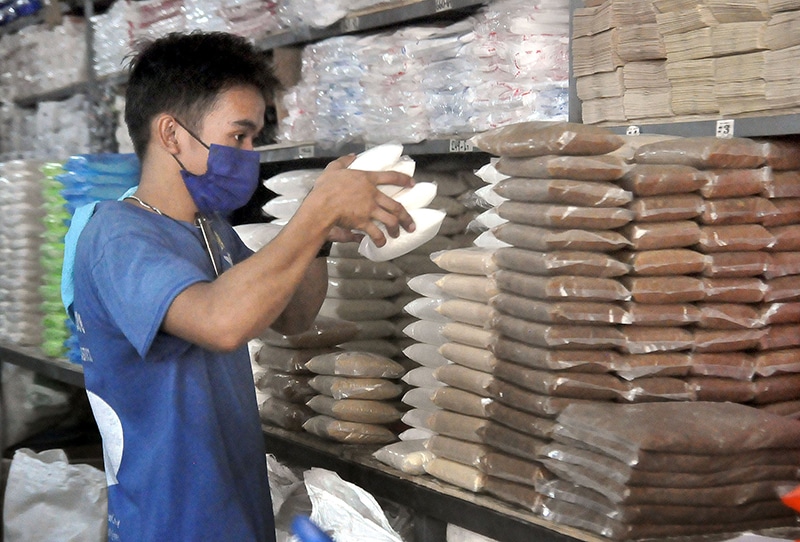Despite efforts to achieve food security, the government is resorting to importation of sugar and salt to address a supply gap.
The Sugar Regulatory Administration (SRA) said Wednesday it has drafted its recommendation to import about 450,000 metric tons (MT) of sugar.
In a radio interview, SRA board member Pablo Luiz Azcona said they are continuously collaborating with stakeholders to discuss the suggested import plan.
“We already drafted our recommendations to Malacañang, and then we are just awaiting instruction [to see] if our suggestions or recommendations are okay,” he said in a mix of English and Filipino.
He said this would include the higher buffer stock that President Ferdinand Marcos Jr. wants.
Azcona said the imported sugar would be open for domestic or retail use.
“Our President is really pro-farmer. Its okay to import sugar for retail so consumers will benefit. If the imports are scheduled right, the farmers won’t feel it,” he said.
He said the timing of imports is relevant to farmers, because their milling season lasts from October to May.
“What the farmers often ask for is that if sugar must be imported, that it arrives after the milling, and after the harvest,” he said.
As of now, the SRA said local farmers can produce up to 1.813 million MT of sugar this year.
The SRA also mentioned that the previous importation of 150,000 MT of sugar has been completed.
Asked if imports would lower market prices, Azcona said the SRA has no control over businessmen.
“Even if the farm gate price is P60 a kilogram then the retail price is in P90, P100, the SRA can do nothing,” he said.
However, he noted that a P60 farm-gate price gives an allowance to farmers who have suffered from the high input costs.
Farmers faced doubled costs of fuel and tripled prices of fertilizers following the Ukraine and Russia conflict.
Farmers earn P28,000 to P56,000 a year per family, he said.
To date, the prevailing market price of refined sugar in Metro Manila ranges from P90 to P110 a kilo. Washed sugar goes for P85 to P95 a kilo while brown sugar costs P80 to P95 a kilo.
Meanwhile, Senator Cynthia Villar, chairperson of the Senate committee on agriculture and food, rebuked the Department of Agriculture (DA) for taking responsibility over the salt industry.
In insisting that salt is considered an agricultural product, Villar said the DA should be responsible for the industry.
“I’m just concerned, the DA is not interested on salt no matter how I look at it as part of the food industry,” said Villar.
“We eat salt. Why is the DA not concerned?” she said.
“The finding is that nobody is interested in the salt industry. I would think they said it’s the DENR (Department of the Environment and Natural Resources), but the DENR will just give permits to use the shoreline or the land for the salt industry.”
At the hearing, the senators learned that it is not the DA, but the Food and Drug Administration (FDA) that issues import permits for salt.
FDA Regulation Officer Givina Tuason said the FDA issues permits for salt importers.
“So you are in charge of the salt?” Villar asked.
Tuason said if the salt is iodized and for human consumption, then it is in charge. If it is not iodized, she said, it is not under the FDA.
Villar shot back: “Why do you import? Do you know the situation of supply and demand? Who’s youur boss who told you to issue import permits? She also questioned the basis for their importation.
Gerard Khonghun of the Philippine Association of Salt Industry Networks told the Senate panel that they get import permits from the Bureau of Customs in importing iodized salt from China and Australia.
Their certification for iodized salt comes from the FDA.
Villar said the country produced 240,000 MT of salt during the 1960s and 1970s.
But today, Villar said we only produce 42,000 MT which is 7 percent of the demand.
She noted that 42,000 MT is only 15 percent of what the country produced before.
When Senator Nancy Binay asked who was in charge of the salt industry, Villar said it seemed nobody in the government was in charge.
It was also learned during the hearing that farmers stopped their salt production as they were not capable of making iodized salt as mandated under Republic Act 8172.
Also on Wednesday, Trade officials said they have no control over the prices of breads and pastries because these do not fall under the suggested retail prices (SRP) of the Department of Trade and Industry (DTI).
Trade Undersecretary for Consumer Protection Group (CPG) Ruth Castelo said the DTI only regulates basic breads under the category of Pinoy Pandesal and Pinoy Tasty.
She added that recent increases in the price of eggs in the local market will not affect the price of budget breads like Pinoy Pandesal and Pinoy Tasty since these breads are made without eggs.
Only premium breads like, ensaymada and cheese rolls, among others, use eggs as a binding ingredient and to soften the texture of breads.
In other developments:
• Former Agriculture secretary William Dar said poor planning at the DA was the main reason for the onion shortage in the country. He said President Marcos, who concurrently heads the DA, should appoint a full-time secretary at the department.
• Senator Sherwin Gatchalian urged the adoption of an agriculture information system that would give the DA regular stock balance and price monitoring of all agricultural products. It would also prevent artificial shortages that hoarders use to generate huge profits.








